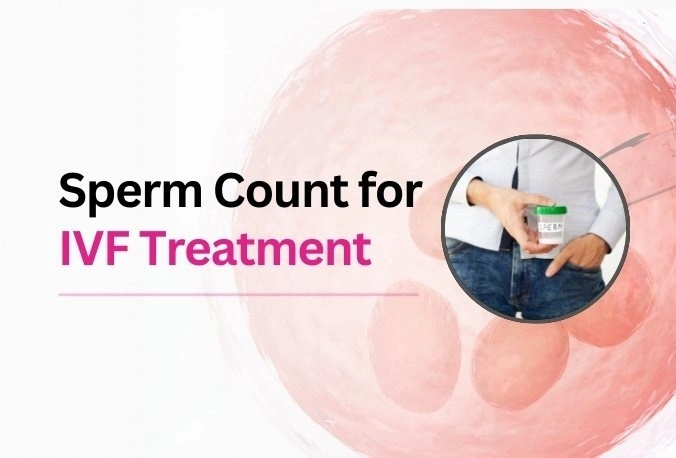Minimum Sperm Count for IVF Treatment
– Published on 8 march 2024

The World Health Organization (WHO) provides guidelines for sperm counts necessary for natural conception. According to WHO, the lower threshold for a ‘normal’ sperm count is considered to be 15 million sperm per milliliter. Anything below this figure is considered ‘low’ and may potentially hinder natural conception.
However, IVF and particularly ICSI (Intracytoplasmic Sperm Injection), a variant of IVF, can work with much lower sperm counts. Even with as few as 1-5 million sperm per milliliter, successful fertilization is possible.
It is also worth noting that factors like sperm motility and morphology can significantly influence fertility beyond the basic count. As such, a comprehensive semen analysis remains an integral first step in determining the most suitable fertility treatment.
How do IVF techniques differ from natural conception?
In contrast to natural conception, which requires a minimum sperm count of 15 million per milliliter as established by WHO, IVF techniques exhibit greater flexibility. The IVF process bypasses many of the hurdles that sperm encounter during natural conception.
The sperm doesn’t need to travel to the fallopian tube; instead, it is combined with the egg in a laboratory setting. Furthermore, Intracytoplasmic Sperm Injection (ICSI), an advanced form of IVF, allows fertilization to occur with even lower sperm counts, sometimes as few as 1-5 million sperm per milliliter.
This technique involves injecting a single sperm directly into an egg. Consequently, IVF and particularly ICSI, can offer hope for individuals with significantly lower sperm counts, reinforcing the importance of personalized fertility treatments.
Factors Allowing Lower Sperm Counts in Some IVF Cases
While the conventional wisdom suggests that higher sperm counts are always preferable for successful conception, IVF techniques can transform this narrative. IVF, and more specifically ICSI, can work effectively with much lower sperm counts. This is primarily due to three factors:
- Bypassing Natural Barriers: In natural conception, sperm must travel a long distance to meet the egg, facing many potential obstacles along the way. In IVF, these natural barriers are removed, as the sperm is combined directly with the egg in a controlled laboratory setting.
- Direct Sperm Injection: ICSI takes this a step further by injecting a single sperm directly into an egg. This means that even if the overall sperm count is low, as long as there is at least one healthy, motile sperm, fertilization is possible.
- Optimised Environment: In IVF/ICSI procedures, the environment is carefully controlled to optimize the chances of successful fertilization. This includes optimal temperature, pH levels, and nutrient-rich culture media, which can help support the survival and function of a limited number of sperm.
It’s important to remember that while these factors make it possible for IVF and ICSI to succeed with lower sperm counts, they do not guarantee success. The quality of the sperm and eggs, the overall health of the individuals, and the expertise of the fertility clinic all play crucial roles in the outcome.
Advanced Sperm Extraction Techniques for Very Low Sperm Counts
In cases where sperm counts are extremely low, advanced sperm extraction techniques come into play. These methods are designed to retrieve sperm directly from the testes or epididymis, bypassing any potential issues in the ejaculatory process. Examples of these techniques include:
- Microsurgical Epididymal Sperm Aspiration (MESA): This method involves the microscopic extraction of sperm from the epididymis, the tube that stores and carries sperm from the testes. MESA is usually performed under general anesthesia.
- Percutaneous Epididymal Sperm Aspiration (PESA): Similar to MESA, PESA involves using a small needle to extract sperm from the epididymis. It’s simpler and less invasive than MESA, but it may not retrieve as many sperm.
- Testicular Sperm Extraction (TESE): This involves surgically retrieving sperm directly from the testicular tissue. This method is used when there is a blockage preventing sperm from being ejaculated or when sperm production is extremely low.
- Microdissection TESE: A more advanced form of TESE, this procedure uses a microscope to identify and extract areas of the testes where sperm production is occurring.
These advanced sperm extraction techniques, combined with IVF and ICSI, provide hope for men with very low sperm counts to still achieve biological parenthood. However, these procedures are not without risks and complications, and should be considered in consultation with a qualified fertility specialist.
In conclusion, it’s important to keep hope alive, as very low sperm counts don’t necessarily spell the end of dreams for biological parenthood. The world of medicine and fertility treatments continues to innovate, providing various strategic options tailored to individual needs.

By Dr Samidha Dalvi-Amale
IVF and Fertility specialist Medical Director- Pune IVF
